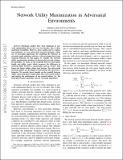Network Utility Maximization in Adversarial Environments
Author(s)
Liang, Qingkai; Modiano, Eytan H
DownloadSubmitted version (535.9Kb)
Terms of use
Metadata
Show full item recordAbstract
Stochastic models have been dominant in network optimization theory for over two decades, due to their analytical tractability. However, these models fail to capture non-stationary or even adversarial network dynamics which are of increasing importance for modeling the behavior of networks under malicious attacks or characterizing short-term transient behavior. In this paper, we consider the network utility maximization problem in adversarial network settings. In particular, we focus on the tradeoffs between total queue length and utility regret which measures the difference in network utility between a causal policy and an 'oracle' that knows the future within a finite time horizon. Two adversarial network models are developed to characterize the adversary's behavior. We provide lower bounds on the tradeoff between utility regret and queue length under these adversarial models, and analyze the performance of two control policies (i.e., the Drift-plus-Penalty algorithm and the Tracking Algorithm).
Date issued
2018-04Department
Massachusetts Institute of Technology. Laboratory for Information and Decision Systems; Massachusetts Institute of Technology. Department of Aeronautics and AstronauticsJournal
IEEE INFOCOM 2018
Publisher
Institute of Electrical and Electronics Engineers (IEEE)
Citation
Liang, Qingkai and Eytan Modiano. “Network Utility Maximization in Adversarial Environments.” Paper presented at the IEEE INFOCOM 2018 Conference, Honolulu, HI, April 15-19, 2018, IEEE © 2019 The Author(s)
Version: Original manuscript
ISBN
9781538641293